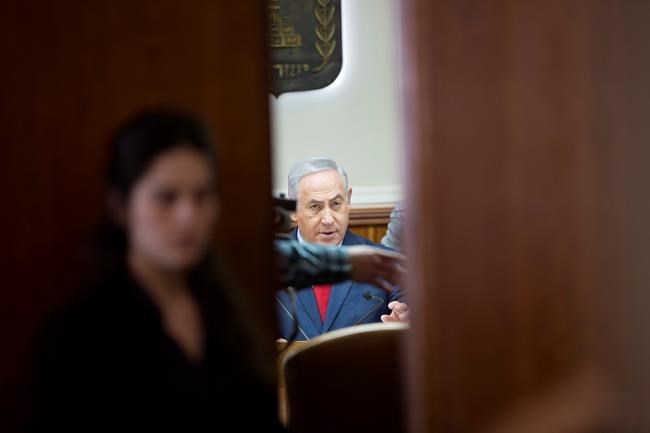
Israeli Prime Minister Benjamin Netanyahu chairs the weekly cabinet meeting at his office in Jerusalem, Sunday, March 11, 2018. (AP Photo/Oded Balilty, pool)
Republished March 12, 2018 - 10:42 AM
Original Publication Date March 12, 2018 - 3:16 AM
JERUSALEM - Prime Minister Benjamin Netanyahu on Monday threatened to take the country to early elections, but said it was too soon to do so as the scandal-plagued Israeli leader manoeuvred to keep his divided coalition intact.
Netanyahu's coalition has been feuding over whether to continue granting exemptions from military service to ultra-Orthodox Jewish men. But looming over Netanyahu's speech was a mountain of corruption scandals.
"If there are elections, we will contend and win, but we are not there yet. The hour is late, but not too late," Netanyahu told a stormy parliamentary session. "We need to make one last supreme effort to preserve the longevity of this government in its current form."
Netanyahu's religious coalition partners have demanded that the government extend the military exemptions. But rival parties have threatened to bolt the coalition over the issue, raising the possibility of early elections.
Netanyahu reached a compromise with a key religious partner at a late-night meeting on Sunday, appearing to defuse the crisis. Then on Monday, a junior coalition partner, Yisrael Beitenu, said it would not support the compromise. Talks between the sides were to continue in the coming days.
Military service for ultra-Orthodox men is one of the most fraught topics in Israel and looked to undermine Netanyahu's coalition government, which holds 66 out of the 120 seats in parliament.
For generations, Israel has given seminary students exemptions from compulsory service. That has infuriated Israel's secular majority, and previous attempts at compromise have been struck down by the Supreme Court.
Netanyahu's opponents have accused him of creating an artificial crisis, potentially triggering elections a year and a half ahead of schedule, in order to shore up his position as he fights the corruption allegations. The thinking is that it would be much harder to force a newly re-elected Netanyahu to step down if he is indicted in the coming months.
Israel's attorney general is expected to make a decision on an indictment by the fall.
After a more than year-long investigation, Israeli police last month said they believed there was sufficient evidence to indict Netanyahu in a pair of bribery scandals.
In one case, Netanyahu is suspected of accepting lavish gifts from a pair of billionaire supporters. In the other, he is suspected of promoting regulation that would benefit an Israeli daily newspaper in exchange for more favourable coverage.
Since then, police have opened a separate investigation into suspicions that Netanyahu, as communications minister, pushed regulation worth hundreds of millions of dollars to Israel's national telecom company Bezeq. The company, led by a friend of Netanyahu, in return allegedly provided favourable coverage to the prime minister and his family on its popular Walla news site.
That investigation is continuing, but two former Netanyahu confidants have already agreed to testify against him in exchange for leniency.
Netanyahu has denied wrongdoing in all of the cases, accusing prosecutors, police and the media of conspiring to oust him.
During Monday's parliamentary session, opposition leaders called on Netanyahu to step aside and accused him of manufacturing a coalition crisis to divert attention from the scandals.
"You want elections before the public knows the truth about your personal corruption, before people who know you and worked with you and know what you did say the whole truth," said opposition lawmaker Tzipi Livni.
In his speech, Netanyahu made no mention of the scandals, but said he had no fears of holding a new election. Opinion polls have shown Netanyahu and his Likud Party gaining popularity as the scandals have mounted.
"In contrast to what you say, the people gave us a mandate," he said in comments aimed at the opposition. "And if there are elections, they will give us an even bigger mandate."
News from © The Associated Press, 2018